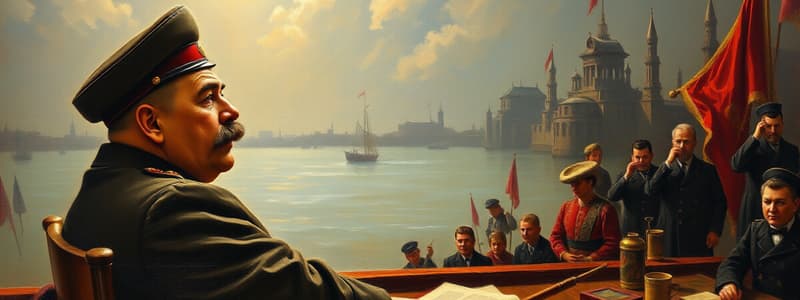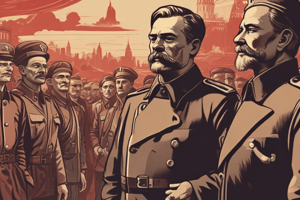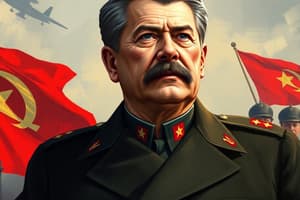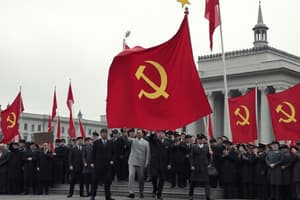Podcast
Questions and Answers
What action did Stalin take to remove Trotsky from power?
What action did Stalin take to remove Trotsky from power?
- He expelled Trotsky from the Soviet Union. (correct)
- He publicly debated Trotsky to undermine him.
- He supported Trotsky in the United Opposition Group.
- He formed an alliance with Trotsky and Zinoviev.
Which criticism did Bukharin make that led to his removal?
Which criticism did Bukharin make that led to his removal?
- He criticized Stalin's policy of collectivization. (correct)
- He opposed Trotsky's alliance with Zinoviev.
- He called for a decentralized government approach.
- He advocated for a return to Lenin's policies.
What ideological shift occurred under Stalin's rule?
What ideological shift occurred under Stalin's rule?
- From socialism to capitalism.
- From totalitarianism to democratic socialism.
- From Lenin-style dictatorship to totalitarianism. (correct)
- From Marxism-Leninism to laissez-faire economics.
What two mechanisms did Stalin utilize to enforce his ideology?
What two mechanisms did Stalin utilize to enforce his ideology?
What was the goal of Stalin's Five-Year Plans?
What was the goal of Stalin's Five-Year Plans?
How did Stalin deal with disagreement within the Communist Party?
How did Stalin deal with disagreement within the Communist Party?
What was a key feature of Stalin's form of government?
What was a key feature of Stalin's form of government?
What influenced Stalin's ability to consolidate power after Lenin's death?
What influenced Stalin's ability to consolidate power after Lenin's death?
What was one of the main roles of the NKVD during Stalin's regime?
What was one of the main roles of the NKVD during Stalin's regime?
Which constitutional change did Stalin implement in 1936?
Which constitutional change did Stalin implement in 1936?
What was the purpose of the collectivization policies under Stalin?
What was the purpose of the collectivization policies under Stalin?
How did Stalin perceive the leadership of the Red Army during his rule?
How did Stalin perceive the leadership of the Red Army during his rule?
What literary constraint was imposed on writers during Stalin's regime?
What literary constraint was imposed on writers during Stalin's regime?
Which of the following statements about censorship under Stalin is true?
Which of the following statements about censorship under Stalin is true?
What was the role of the Ministry for State Security (MGB) during Stalin's regime?
What was the role of the Ministry for State Security (MGB) during Stalin's regime?
How did Stalin's constitution of 1936 alter perceptions of governance in the USSR?
How did Stalin's constitution of 1936 alter perceptions of governance in the USSR?
What was the function of the Gulags during Stalin's regime?
What was the function of the Gulags during Stalin's regime?
Which of the following best describes Stalin's view on propaganda?
Which of the following best describes Stalin's view on propaganda?
What contributed to the widespread terror during Stalin's rule?
What contributed to the widespread terror during Stalin's rule?
What was one outcome of Stalin's Five-Year Plans?
What was one outcome of Stalin's Five-Year Plans?
Which statement about Stalin's policy on education is true?
Which statement about Stalin's policy on education is true?
What was the primary focus of Stalin's Five-Year Plans?
What was the primary focus of Stalin's Five-Year Plans?
What was a major consequence of the unrealistic targets set during the Five-Year Plans?
What was a major consequence of the unrealistic targets set during the Five-Year Plans?
How did the heavy industry benefit from Stalin’s Five-Year Plans?
How did the heavy industry benefit from Stalin’s Five-Year Plans?
Which of the following was a significant issue during the Second and Third Five-Year Plans?
Which of the following was a significant issue during the Second and Third Five-Year Plans?
What was the role of Alexei Stakhanov in the context of the Five-Year Plans?
What was the role of Alexei Stakhanov in the context of the Five-Year Plans?
What was one of the primary criticisms of the economic reforms under Stalin?
What was one of the primary criticisms of the economic reforms under Stalin?
By how much did coal production increase from 1927 to 1940 according to the provided statistics?
By how much did coal production increase from 1927 to 1940 according to the provided statistics?
What hindered the effectiveness of the Second and Third Five-Year Plans?
What hindered the effectiveness of the Second and Third Five-Year Plans?
What was the result of the Fourth Plan’s focus on heavy industry after World War II?
What was the result of the Fourth Plan’s focus on heavy industry after World War II?
Which production statistics revealed a remarkable increase from 1927 to 1940?
Which production statistics revealed a remarkable increase from 1927 to 1940?
What problem did the Soviet Union face due to Stalin’s neglect of agriculture?
What problem did the Soviet Union face due to Stalin’s neglect of agriculture?
How did Stalin's policies affect the Soviet Union's ability to compete with Western economies?
How did Stalin's policies affect the Soviet Union's ability to compete with Western economies?
Which statement best describes the overall outcomes of the first Five-Year Plan?
Which statement best describes the overall outcomes of the first Five-Year Plan?
What event is described as marking the climax of Stalin's political purges during the Five-Year Plans?
What event is described as marking the climax of Stalin's political purges during the Five-Year Plans?
What was the main purpose of collectivization under Stalin?
What was the main purpose of collectivization under Stalin?
Which event significantly impacted worker conditions during the First Five Year Plan?
Which event significantly impacted worker conditions during the First Five Year Plan?
What was a consequence of Stalin's censorship policies?
What was a consequence of Stalin's censorship policies?
What was one result of the Holodomor in Ukraine?
What was one result of the Holodomor in Ukraine?
How did Stalin treat national minorities after World War Two?
How did Stalin treat national minorities after World War Two?
In what way did Stalin’s Constitution of 1936 appear to address minority rights?
In what way did Stalin’s Constitution of 1936 appear to address minority rights?
What was the main purpose of the Five-Year Plans?
What was the main purpose of the Five-Year Plans?
How did Stalin's regime view religion?
How did Stalin's regime view religion?
What was a typical work day for factory workers by 1932 during Stalin’s regime?
What was a typical work day for factory workers by 1932 during Stalin’s regime?
What ideology did Soviet cinema and media primarily serve under Stalin?
What ideology did Soviet cinema and media primarily serve under Stalin?
What was the fate of the clergy during the Great Terror under Stalin?
What was the fate of the clergy during the Great Terror under Stalin?
Which group was predominantly blamed during the collectivization in Ukraine?
Which group was predominantly blamed during the collectivization in Ukraine?
What was the underlying ideology behind Stalin’s purges?
What was the underlying ideology behind Stalin’s purges?
What was the primary function of the Pioneers and Komsomol youth groups under Stalin?
What was the primary function of the Pioneers and Komsomol youth groups under Stalin?
What principle guided Soviet cinema during Stalin's era?
What principle guided Soviet cinema during Stalin's era?
What significant event contributed to the establishment of the Stakhanovite movement?
What significant event contributed to the establishment of the Stakhanovite movement?
How did Stalin's Great Purge affect the military leadership?
How did Stalin's Great Purge affect the military leadership?
What was a major consequence of the collectivisation policy during Stalin's rule?
What was a major consequence of the collectivisation policy during Stalin's rule?
What was the underlying motivation for the Five-Year Plans?
What was the underlying motivation for the Five-Year Plans?
Which show trial involved high-profile Communist leaders and was held in 1936?
Which show trial involved high-profile Communist leaders and was held in 1936?
What was the estimated number of executions during the Great Purge?
What was the estimated number of executions during the Great Purge?
What aspect of culture did Stalin's regime seek to control?
What aspect of culture did Stalin's regime seek to control?
What was Gosplan responsible for in the context of Stalin's Five-Year Plans?
What was Gosplan responsible for in the context of Stalin's Five-Year Plans?
Workers during the 1920s and 1930s primarily viewed the Five-Year Plans as:
Workers during the 1920s and 1930s primarily viewed the Five-Year Plans as:
Which of the following was a result of the purges carried out during Stalin's regime?
Which of the following was a result of the purges carried out during Stalin's regime?
During the collectivisation phase, the mir was dismantled. What was the mir?
During the collectivisation phase, the mir was dismantled. What was the mir?
What was one primary goal of Stalin's education reforms?
What was one primary goal of Stalin's education reforms?
How did the policy of collectivisation impact food production during Stalin's rule?
How did the policy of collectivisation impact food production during Stalin's rule?
By the mid-1930s, what percentage of Moscow's population lived in shared one-room accommodations?
By the mid-1930s, what percentage of Moscow's population lived in shared one-room accommodations?
What was a significant change in higher education for women under Stalin?
What was a significant change in higher education for women under Stalin?
What was a common living condition in Soviet towns during Stalin's regime?
What was a common living condition in Soviet towns during Stalin's regime?
How did Stalin's policies compare to the previous Tsarist regime?
How did Stalin's policies compare to the previous Tsarist regime?
What political group held significant popularity in Romania during its transition to communism?
What political group held significant popularity in Romania during its transition to communism?
What characterizes the average living space for citizens in 1935 compared to 1905?
What characterizes the average living space for citizens in 1935 compared to 1905?
What was the effect of Stalin's agricultural policies on meat consumption by the end of the 1930s?
What was the effect of Stalin's agricultural policies on meat consumption by the end of the 1930s?
What was a significant action taken by Wladyslaw Gomulka's rule over Poland?
What was a significant action taken by Wladyslaw Gomulka's rule over Poland?
Which country was forced to become a communist one-party state under Petru Groza by April 1948?
Which country was forced to become a communist one-party state under Petru Groza by April 1948?
Which of the following problems was worsened by World War Two in the Soviet Union?
Which of the following problems was worsened by World War Two in the Soviet Union?
What demographic shift occurred in secondary school attendance from 1931 to 1932?
What demographic shift occurred in secondary school attendance from 1931 to 1932?
How did the elections in Bulgaria in October 1946 affect the political landscape?
How did the elections in Bulgaria in October 1946 affect the political landscape?
What was Stalin's approach to controlling Hungary compared to other Eastern Bloc countries?
What was Stalin's approach to controlling Hungary compared to other Eastern Bloc countries?
What was the main reason Stalin targeted adult literacy during his rule?
What was the main reason Stalin targeted adult literacy during his rule?
What impact did the Five-Year Plans have on industrialisation in the Soviet Union?
What impact did the Five-Year Plans have on industrialisation in the Soviet Union?
What event marked the beginning of Russian military involvement in World War II?
What event marked the beginning of Russian military involvement in World War II?
What was a result of the Nazi-Soviet Pact for Russia's military strategy?
What was a result of the Nazi-Soviet Pact for Russia's military strategy?
What was a consequence of Stalin's emphasis on industrialisation?
What was a consequence of Stalin's emphasis on industrialisation?
Which country experienced a degree of independence until the offer of Marshall Aid in 1948?
Which country experienced a degree of independence until the offer of Marshall Aid in 1948?
How did Stalin's policies impact the role of party officials within society?
How did Stalin's policies impact the role of party officials within society?
Which factor contributed to the tightening of Soviet control in Romania after World War II?
Which factor contributed to the tightening of Soviet control in Romania after World War II?
What was a notable characteristic of the elections held in Czechoslovakia in 1946?
What was a notable characteristic of the elections held in Czechoslovakia in 1946?
What significant military conflict occurred between the Soviet Union and Finland from November 1939 to March 1940?
What significant military conflict occurred between the Soviet Union and Finland from November 1939 to March 1940?
Which action indicated Stalin's view of Germany as a continued threat leading up to World War II?
Which action indicated Stalin's view of Germany as a continued threat leading up to World War II?
What was the impact of the Marshall Plan on the political landscape of Eastern Europe?
What was the impact of the Marshall Plan on the political landscape of Eastern Europe?
What was the primary aim of collectivisation according to Stalin?
What was the primary aim of collectivisation according to Stalin?
Which group did Stalin blame for the failures in agriculture during collectivisation?
Which group did Stalin blame for the failures in agriculture during collectivisation?
What was one of the main consequences of collectivisation for peasants?
What was one of the main consequences of collectivisation for peasants?
What percentage of peasant farms were collectivised during the initial phase from December 1929 to March 1930?
What percentage of peasant farms were collectivised during the initial phase from December 1929 to March 1930?
How did food consumption change from 1928 to 1932 among peasants?
How did food consumption change from 1928 to 1932 among peasants?
What mechanism did Stalin implement to control the movement of peasants to cities?
What mechanism did Stalin implement to control the movement of peasants to cities?
What was the impact of collectivisation on the livestock population in Kazakhstan?
What was the impact of collectivisation on the livestock population in Kazakhstan?
What was one reported behavior of peasants in response to collectivisation?
What was one reported behavior of peasants in response to collectivisation?
Which of these statements is true regarding the types of farms established during collectivisation?
Which of these statements is true regarding the types of farms established during collectivisation?
What was one proposed benefit of tractors during collectivisation?
What was one proposed benefit of tractors during collectivisation?
In which way did urban areas fare compared to rural areas during the period of collectivisation?
In which way did urban areas fare compared to rural areas during the period of collectivisation?
Which reason did Stalin NOT give for collectivisation?
Which reason did Stalin NOT give for collectivisation?
What happened to consumption of bread per head from 1928 to 1932?
What happened to consumption of bread per head from 1928 to 1932?
What was the official response to reports of famine during collectivisation?
What was the official response to reports of famine during collectivisation?
What was a significant consequence of the Second World War for the Soviet Union's workforce?
What was a significant consequence of the Second World War for the Soviet Union's workforce?
Which event marked the official start of Operation Barbarossa?
Which event marked the official start of Operation Barbarossa?
What was one reason for the Soviet Union's economic struggles after the war?
What was one reason for the Soviet Union's economic struggles after the war?
How did Stalin view prisoners of war who returned home?
How did Stalin view prisoners of war who returned home?
What was the focus of Stalin's fourth Five-Year Plan?
What was the focus of Stalin's fourth Five-Year Plan?
Which statement reflects Stalin's approach to governance during the war?
Which statement reflects Stalin's approach to governance during the war?
What led to the famine in 1947 in the Soviet Union?
What led to the famine in 1947 in the Soviet Union?
What was a major criticism of Stalin's post-war economic strategy?
What was a major criticism of Stalin's post-war economic strategy?
How did the number of Communist Party members change during the war?
How did the number of Communist Party members change during the war?
What action did the NKVD take during and after the war?
What action did the NKVD take during and after the war?
What was one result of the German invasion and the subsequent Soviet counter-offensive?
What was one result of the German invasion and the subsequent Soviet counter-offensive?
What was the significance of the pact signed between Russia and Japan prior to the invasion?
What was the significance of the pact signed between Russia and Japan prior to the invasion?
Which of the following was a consequence of the war on Soviet factories?
Which of the following was a consequence of the war on Soviet factories?
What challenge did the Soviet government face in their post-war reconstruction?
What challenge did the Soviet government face in their post-war reconstruction?
Flashcards are hidden until you start studying
Study Notes
Stalin's Rise to Power
- Stalin consolidated power after Lenin's death through strategic alliances and manipulation of party factions.
- He allied with Zinoviev and Kamenev to eliminate Trotsky, who was expelled by 1929.
- Criticism from Bukharin on collectivisation led to his removal, solidifying Stalin's control over the Communist Party.
- By 1929, Stalin had defeated opposition and transformed into a dictator, gaining mastery over the Communist state.
Ideology: Totalitarianism and Marxism-Leninism-Stalinism
- Stalin enhanced Marxism-Leninism into a totalitarian ideology, emphasizing a strong superstructure controlled by one leader.
- Key components included a command economy and strict propaganda to suppress dissent.
- Historians debate whether Stalin adapted ideology for practical solutions or for personal ambition, leading to widespread repression.
Central Government Control
- Stalin maintained tight control of government organs, requiring centralized authority for policies like collectivisation and the Five-Year Plans.
- 1936 constitutional changes aimed to project a democratic façade while ensuring Communist Party dominance.
Methods of Control
- Secret Police (NKVD): Established in 1934 to enforce terror, implement purges, and oversee Gulags where millions were imprisoned.
- Army's Role: The Red Army was both a tool for Stalin's policies and faced purges that decimated its leadership, leaving it vulnerable before WWII.
Censorship and Propaganda
- Stalin intensified censorship; all artistic works were mandated to align with "socialist realism."
- Writers faced severe consequences for dissent; many were arrested or exiled.
- Propaganda glorified Stalin and the Soviet Union, portraying him as a man of the people and promoting achievements of the Five-Year Plans.
The Great Purge/Great Terror (1936-1938)
- Characterized by mass arrests and executions, often justified as responses to alleged plots against the state.
- Key show trials involved high-ranking Communists accused of plotting against Stalin, leading to widespread purges across various government sectors.
- Around 750,000 executions were estimated during this period of terror.
Economic Changes: Five-Year Plans
- Stalin initiated Five-Year Plans starting in 1928 to industrialize the Soviet Union rapidly.
- The First Plan (1928-1932) set ambitious production targets leading to falsified success reports, yet significant increases were achieved in coal, iron, and electricity.
- Subsequent Plans focused on heavy industry, with mixed results due to lack of coordination and real planning, despite significant industrial outputs.
Impact of Five-Year Plans
- By 1940, coal production increased fivefold, with substantial rises in steel and electricity generation, equipping the USSR for military needs.
- Living conditions worsened as Stalin prioritized industrial growth over consumer welfare and agricultural development, leading to an unbalanced economy.
- The Fourth Plan (1946-1950) prioritized heavy industry after WWII, struggling with low agricultural outputs and maintaining harsh working conditions post-war.### Fourth Plan Achievements
- Significant industrial growth in the USSR, with capacity only second to the USA by 1950.
- Industrial fabric strengthened despite central planning failures and a decline in worker welfare.
- Devaluation of the rouble by 90% in 1947 diminished savings and purchasing power.
- Shortages of consumer goods persisted, severely impacting living conditions.
- Key production figures illustrate mixed results from 1940 to 1950 with notable increases in coal and electricity.
Collectivisation Objectives
- Stalin aimed to finance industrialisation by mobilising agricultural resources through collectivisation.
- Collective and State Farms were created; peasants pooled land and resources for central management, contrary to claims of voluntary participation.
- Stalin targeted affluent peasants (Kulaks) for blame, leading to ‘De-Kulakisation’ and widespread repression.
Impact of Collectivisation
- Massive social upheaval as traditional farming practices were disrupted; starvation rampant.
- Famine mainly affected rural areas, especially Ukraine and Kazakhstan; 10-15 million peasants perished during the 1930s.
- Agricultural productivity barely improved by the late 1930s, reflecting long-term damage.
- Stalin’s policies inadvertently forced many peasants to migrate to urban factories, supporting industrialisation efforts.
Changes in Stalin's Society
- Hierarchical structures emerged in Communist Party, echoing tsarist regimes.
- Political repression, censorship, and purges created a climate of fear and stunted individual freedoms.
Education Reforms
- Primary education became compulsory and enrollment surged to 18 million by 1930.
- Curriculum shifted from basic literacy to revolutionary ideologies, with adult literacy campaigns introduced.
- Increased opportunities for women in higher education, significantly raising female engineering student statistics.
Housing Conditions
- Urban overcrowding resulted in shared living quarters; average living space decreased significantly.
- Post-WWII homelessness affected 25 million people; housing issues persisted through Stalin's tenure, leaving a legacy for Khrushchev.
Food and Famine Strategies
- Food production fluctuations with notable famines in 1921 and 1932-34.
- Collectivisation efforts directly correlated to hardships faced by the rural population.
- U.S.S.R’s agricultural output and food consumption remained detrimental through Stalin's leadership.
Worker Conditions
- Harsh conditions for factory workers with extended hours and declining wages during the First Five-Year Plan.
- Safety concerns in factories worsened, compounded by fears of purges against workers labeled anti-revolutionary.
Personal Freedoms under Stalin
- The NKVD enforced strict controls to eliminate opposition; 40 million imprisoned in Gulags during 1934-1943.
- Censorship limited freedom of expression; writers faced severe consequences for non-conformity.
- Religion faced persecution, with a drastic decline in functioning churches by 1938.
Minorities Before World War Two
- Stalin implemented a constitution allowing theoretical representation for national minorities, but repression dominated political life.
- Ukraine experienced devastating oppression under collectivisation, with death tolls rising significantly due to famine and purges.
Minorities After World War Two
- Collaboration accusations led to mass deportations of minority populations to Central Asia.
- Strategic importance shaped Soviet control over Eastern Europe; the USSR exerted influence and power strongly post-war.
- Countries like Poland, Romania, and Bulgaria fell under communist control through intimidation, purges, and manipulation of elections.### Hungary
- Hungary was not a key strategic focus for the Soviets post-World War II; they prioritized reparations over direct control.
- Stalin intended to create a buffer zone in Central Europe between the Soviet influence and the West.
- Up to 1947, Hungary maintained a semblance of freedom, including a free press and parliamentary debates.
- The Communists controlled the Ministry of the Interior, allowing them to maintain police power throughout this period.
- By 1948, Hungary was integrated fully into the Eastern Bloc, losing its independence.
Czechoslovakia
- Similar to Hungary, Czechoslovakia had no significant strategic value for the Soviet Union, allowing a degree of independence.
- In the 1946 elections, the Communist Party emerged as the largest faction, leading a coalition government without coercion.
- The shift occurred in 1948 with the promise of U.S. Marshall Aid, prompting the Soviets to tighten their control.
- Czechoslovakia was the last Eastern Bloc nation to fall under Soviet control in 1948.
Causes of World War Two
- Long-term causes of the war trace back to Hitler's rise in 1933 and subsequent German-Polish non-aggression treaties.
- The Soviet Union reacted by terminating its treaties with Poland and Baltic states in 1934, signaling readiness for conflict if provoked.
- Admission to the League of Nations in 1934 while Germany and Japan withdrew heightened tensions.
- Stalin provided limited support in the Spanish Civil War to avoid antagonizing Germany, while Germany formed an anti-communist alliance.
- By 1938, Stalin recognized the threat posed by Germany, particularly after the Munich Conference excluded Soviet support.
- The Nazi-Soviet non-aggression pact of August 1939 divided Eastern European territories between Germany and the Soviet Union.
Short-term Causes
- Germany's invasion of Poland on September 1, 1939, marked the beginning of World War II.
- During the initial phase of the war, Soviet neutrality was maintained under the Nazi-Soviet Pact, but preemptive defense actions were taken.
- The Baltic States were coerced to allow Soviet troop stations, while Finland rejected similar demands, leading to the Winter War (1939-1940).
- Germany's success in the west convinced Stalin of an impending attack, resulting in preparations for Operation Barbarossa, which commenced on June 22, 1941.
Consequences of the Second World War
Social Effects
- The death toll for the Soviet Union exceeded 27 million, with a significant portion being civilians.
- The war caused severe labor shortages which hindered post-war recovery.
- Deserters faced execution; 13,000 were shot for this offense.
- The Soviet army's conduct during the war included significant instances of sexual violence, particularly during the counter-offensive into Germany.
Economic Effects
- The post-war economy faced substantial damage to infrastructure and industrial facilities.
- Factories were reconverted and relocated, affecting production efficiency.
- The fourth Five-Year Plan (1946-1950) aimed to restore pre-war economic conditions, with consumer goods neglected.
- Goals were achieved faster than expected due to available labor from returned POWs and international aid.
- Economic weaknesses persisted, including failures in agricultural policy and misallocated resources.
Political Effects
- Stalin maintained power without significant changes to the government structure during the war.
- He controlled military decisions via the State Defence Committee, relying on military advisers for strategic planning.
- Membership in the Communist Party grew during the war, reflecting military enlistees and wartime patriotism.
- The NKVD expanded its role, purging perceived dissidents and managing post-conflict deportations of certain ethnic groups.
Studying That Suits You
Use AI to generate personalized quizzes and flashcards to suit your learning preferences.




